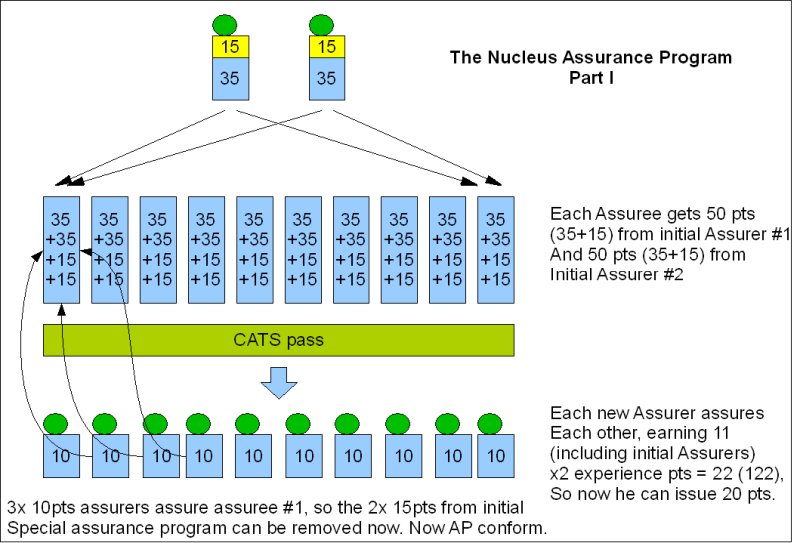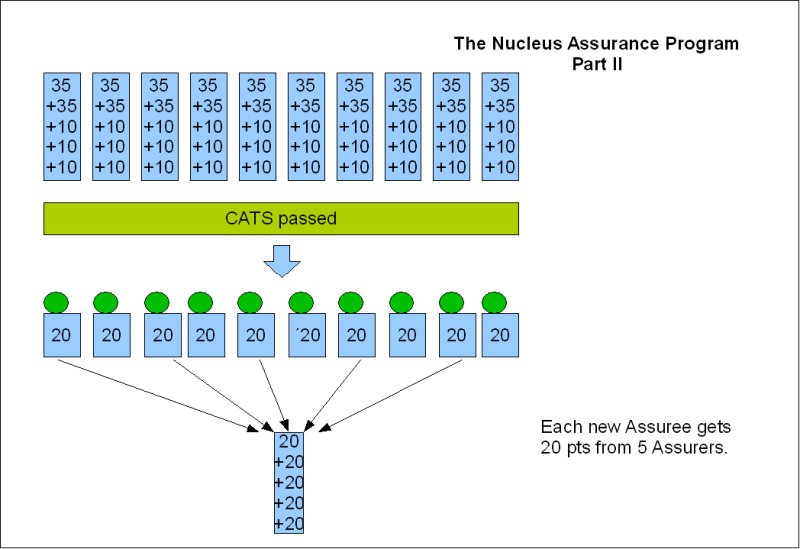The Nucleus Assurance Program
Role of this document
This page is for rethinks, discussion, etc. This wiki page is not policy but is intended as a future replacement for the Super-Assurers programme.
Special Assurance Program - Seeding CAcert Deserts
After terminating the special Assurance Programme "Super-Assurance" and limiting the assurance points in any assurance to 50, we have a dilemma: How to follow the AP and continue to "seed the deserts".
This Nucleus Special Assurance Program is one possible answer.
The Problem
With the standard procedure at least 3 Assurers are needed to bring a new member to Assurer level. Finding three experienced Assurers able and willing to travel at the same time is hard, and transporting them "into the desert" costs lots of money.
The alternative, the Trusted Third Party (TTP) program, is currently not available. A subsidiary policy still has to be created for every country/region. Also TTP has the disadvantage that the newly created Assurer has never seen a live CAcert Assurance and has to learn CAcert procedures and policies mainly from written documentation.
The Proposal
The Assurance Policy Chapter 4.3 allows to create subsidiary policies which raise the number of awarded Assurance Points per Assurance up to 50 points in specific circumstances.
A Nucleus Policy may therefor define something like "Nucleus Assurers", which may, for a limited time, award 50 Assurance Points for their Assurances. So two Nucleus Assurers together can award the 100 points needed to create a new Assurer.
This would allow the following procedure:
- A meeting is arranged with two Nucleus Assurer and ideally 10 CAert Members
- Nucleus Assurers are experienced Assurers and can train the Members in the ways of CAcert
- The two Nucleus Assurers assures the ten Members to 100 Assurance Points
- The Members do the Assurer Challenge (or have already done it) which makes them newbie Assurers
- The newbie Assurers assure each others and the Nucleus Assurers. So each of them does 11 Assurances, receives 22 Experience Points and can now issue 20 Assurance Points per Assurance themselves.
This creates a nucleus of 10 Assurers. If someone wants to become Assurer they initially have to visit 5 of those new Assurers to collect their 100 Assurance Points.
Detailed Discussion
Problem: Bringing 3 experienced Assurers to the deserts is a problem, and probably is too expensive.
Possible solution: Bringing 2 experienced Assurers to the deserts is more likely, more possible and can still be helpful for seeding the deserts.
Dependency: But, to assure Members to 100 points with only 2 Assurers requires a sub-policy under AP, so that two Assurers can issue 50 assurance points, each, in an initial assurance event.
The Nucleus Special Assurance Program works in 2 steps:
The initial Assurance Event 
The initial Assurance Event is also an education and training event. The new Assurer Candidates needs to be trained to pass the CATS test. This proposes a variation of the Assurer Training Events (ATEs) with special ATE preparations differing from regular assurance events. Other possible options include: do the training on a weekly basis as a training course, or do an one day Assurance Training Event.
The follow-on Assurances once nucleus is formed 
Once a nucleus is set, the group of available Assurers can handle local assurance events by themselves. For each event not all Assurers are needed, but there are enough Assurers available to handle assurance requests.
Initial 50 pts Assurances
This program needs usage of the 50 pts maximum issuing that is covered under AP. Therefore the visiting Assurers (if only 2) needs a temporary administrative increase for issuing 100 points in total so the new assurer candidates can start with the assurer training. As all special assurance programs (Superassurer) are frozen by the board motions
m20090912.1 that freezes this program and
m20090914.2 take it in effect.
this new program steps into a variation of the Superassurance program. The initial issued 50 pts by the initial assurers can be later decreased to 35 pts so the assurances are now conformed to AP because in the meanwhile all assurers get enough points from the other new assurers.
Practical Samples
- 2 students visiting an university. Before leaving back to home, they get trained and becomes experienced assurers. They now can seed their home city
- 2 friends starting a vacation tour. They are willing to serve 2 days for doing an ATE and an assurance event
- 2 Engineers have a foreign country commitment for 1 or 2 weeks. They have some time in the evenings to organize educational and training events.
- 1 Engineer have a foreign country commitment for 1 or 2 weeks in an area with one existing CAcert assurer. He organizes the training events with the assurer at the target location.
Related Documents
https://svn.cacert.org/CAcert/Policies/DesertSeedingPolicy.html is the first try for a Nucleus Policy, which is now deprecated.
Contributions
(2010-02-14 UlrichSchroeter)
- (03:32:21) u60: a new program can be a mixture of the ttp (yet frozen, but the new ttp policy is in the pipeline) and the nucleus program ....
- (03:33:18) u60: the idea .... 2 people are needed who undergo a ttp assurance ... finding 10 people (same as nucleus program) ....
- (03:35:06) u60: and - in difference to the default nucleus program going thru an educational / training phase about CAcert assurances ... doing an online interview (phone, skype, irc, or similiar), doing a fiddle test (something like the CATS test) ... going thru the CATS test ... and starting the nucleus ...
While it surely is better to have 10 people as nucleus I guess it will be hard to find 10 people in every desert. So I'd propose to set the minimum number of prospective Assurers for a nucleus event to 5 Assurers and use additional Experience Points from AP to get them to 30 Experience Points. Then they can issue 25 Assurance Points and four of them can create a new Assurer. The additional 18 Experience Points can be justified by the fact that they attended an ATE, which indeed should increase their experience more than simply doing some Assurances. BernhardFröhlich
The prospective Assurers should be encouraged to try the CATS test before attending the "nucleus event", so they may ask the "seeding Assurers" if there should be questions or problems. BernhardFröhlich
